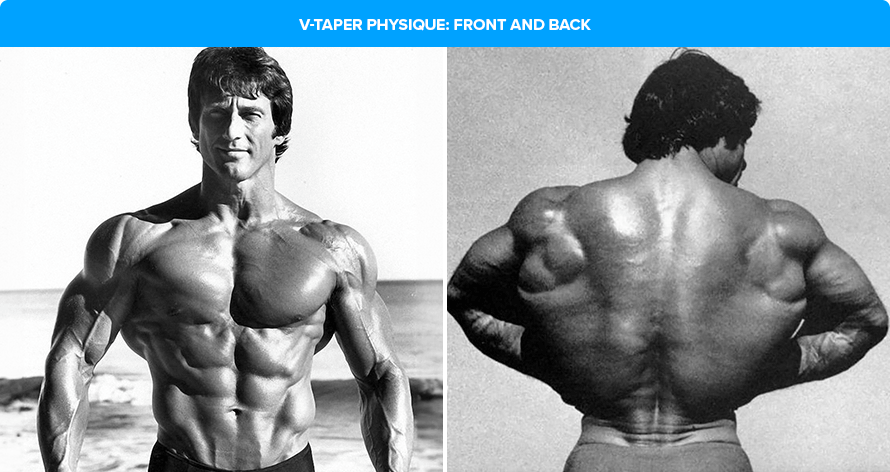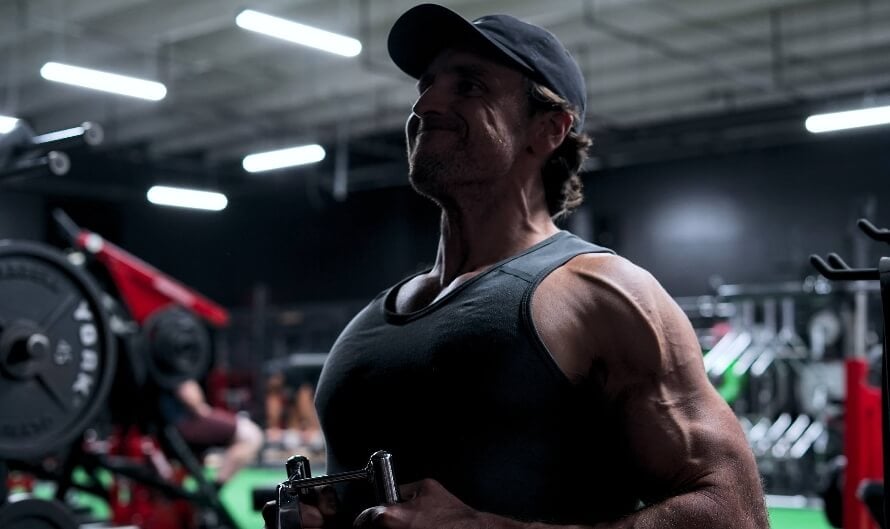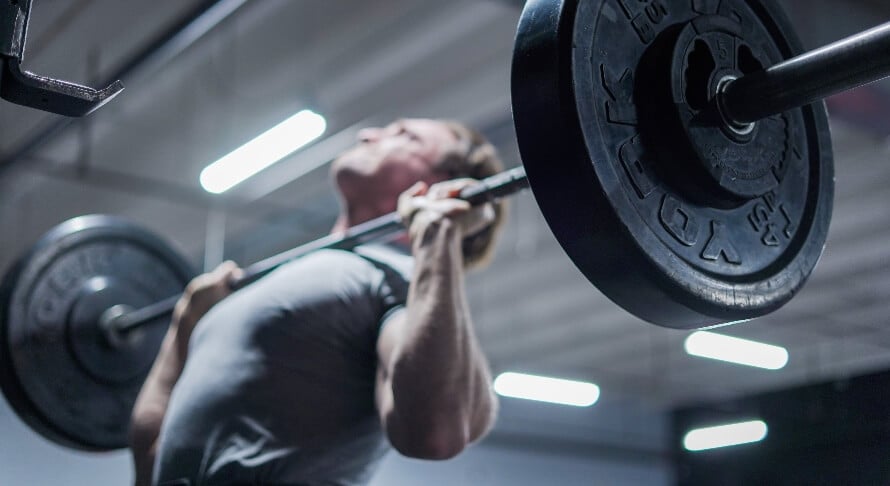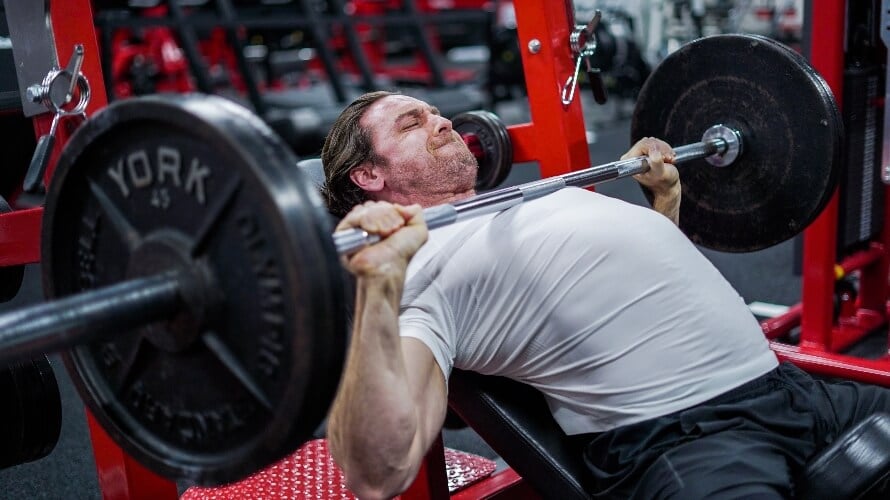No clothing or accessories look as sharp as a lean, muscular physique.
And nothing embodies that better than a V-tapered torso with wide shoulders and a broad back tapering to a trim waist.
It’s been admired for centuries, from Grecian statues to modern bodybuilding stages, as a symbol of athleticism, strength, and physical attractiveness.
And that’s why the pursuit of a V-shaped body remains a popular goal.
However, many of those keen on getting a V-taper make mistakes that prevent them from achieving the look they want.
For instance, they focus on developing the wrong muscles, do ineffective exercises, and follow unproductive workout routines. They typically also miss a crucial piece of the puzzle: diet.
In this article, you’ll learn what it really takes to get a V-taper body.
We’ll explore what a V-taper physique is, why it’s important, how to get a V-taper through diet and exercise, and more.
Key Takeaways
- A V-taper physique is a body shape characterized by a wide upper back and broad shoulders that narrows to a slim waist.
- Building a V-taper is a popular physique goal because it’s a symbol of strength, health, and physical attractiveness.
- To get a V-tapered body you must build shoulder, back, and chest muscle and lose belly fat.
- The best exercises for building a V-taper include overhead presses, lateral raises, deadlifts, rows, pull-ups, pulldowns, and incline and close-grip bench presses.
- To build a V-taper physique as quickly as possible, use a high-quality protein powder to hit your daily protein target, creatine to boost recovery and growth, and a pre-workout to enhance energy, focus, and athletic performance.
Table of Contents
+
What Is a V-Taper Physique?
A V-taper physique is a body shape characterized by a wide upper back and broad shoulders that narrows to a slim waist, forming a “V” shape when viewed from the front or behind.
Here are some examples of how an aesthetic V-taper build might look from the front and back:

Why Is a V-Taper Body Important?
A V-shaped body is highly sought after for a few reasons:
- It’s a sign of a strong, athletic body since broad shoulders and a strong back contribute to better leverage, stability, and power in various sports and physical activities.
- High muscularity and low body fat percentage are signs of health.
- A V-shaped torso is emblematic of symmetry and proportion, which are two of the main judging criteria in bodybuilding.
- Research shows a V-shaped male body is more attractive to females than other body shapes.
In other words, a V-taper signals strength, health, and physical beauty.
How to Get a V-Tapered Body: Step-by-Step Guide

Getting a V-taper primarily comes down to doing exercises and workouts that develop the muscles responsible for broadening your upper body and getting leaner.
Let’s break it all down step by step.
Step #1: Broaden Your Shoulders
Your shoulders are the capstone of a V-taper. Building them makes your upper body appear wider and creates the illusion that your waist is slimmer.
On the flip side, if they’re underdeveloped, you’ll never achieve a dramatic V-taper build because the upper part of your torso won’t be noticeably wider than your waist.
Step #2: Develop Your Back and Chest
While building wide shoulders is crucial for developing a V-taper physique, there’s more to it than that.
To get the balanced, 360-degree thickness required for a standout V-taper, you need to develop your upper back, lats, and upper chest muscles, too.
If you don’t, your torso will look more like a T than a V.
Step #3: Lose Belly Fat
Sorry but not sorry: nothing destroys physiques faster than fat gain—and a V-taper is no exception.
No matter how wide your shoulders and back are, you’ll never achieve a V-taper physique if you also have too much belly fat.
You don’t need to have a single-digit body fat percentage, but if you’re north of 12% body fat as a man or 20% as a woman, you’ll need to slim down to reach your goal.
The Best V-Taper Exercises

We’ve already covered the broad strokes of how to build a V-taper physique. Now let’s get into the nitty gritty and look at the exercises that will make the biggest difference.
Shoulder Exercises
Split your shoulder training into two parts:
- Compound overhead pressing: The standing and seated overhead press, shoulder press, and Arnold press are perfect for building overall shoulder mass. For these, train with heavier weights in the 4–6 rep range.
- Side delt isolation exercises: Dumbbell or cable side lateral raises and upright rows train the side delts more directly, which is vital for making your V-taper “pop.” Do these in a slightly higher rep range like 6–8 or 8–10.
READ MORE: How to Grow Broader and Wider Shoulders
Upper Back Exercises
Deadlift variations, such as the conventional, sumo, trap-bar, and Romanian deadlift are the best way to build upper back strength and size. Do these with heavy weights in the 4–6 rep range.
Supplement your deadlifting with rows. Barbell, dumbbell, chest-supported, and cable rows are all good options for mid- and upper-back thickness.
Generally speaking, rowing with heavy weights in the 4–6 rep range is best. That said, the 6–8 rep range also works if you’re rowing after deadlifting and lifting maximally heavy weights feels too daunting or impractical.
READ MORE: The Best Upper Back Exercises for Mass and Strength
Lat Exercises
The best exercises for a V-tapered back are the pull-up, chin-up, lat pulldown, and close-grip lat pulldown. These exercises emphasize your lats, which are the muscles most associated with a V-taper.
Do these in the 4–6 rep range if you perform them early in your workout, or in the 6–8 or 8–10 rep range if you do them later after several sets of deadlifts and rows.
READ MORE: Lat-Focused Workouts: The 11 Best Lat Exercises for Muscular Lats
Upper Chest Exercises
When it comes to building a V-taper physique, many people overlook the upper chest.
This is a mistake.
While it may not be as important as the shoulders and back, filling out the upper portion of your pecs balances your V-taper and prevents it from looking back- or bottom-heavy.
The incline barbell and dumbbell bench press are your bread and butter here, though close-grip bench pressing is also great for emphasizing the upper pecs. To maximize muscle and strength gain, do these in the 4–6 rep range.
READ MORE: Build a Strong Upper Chest With These Ultimate Upper-Pec Exercises
V-Taper Workout Routine

The following V-taper workout routine contains all the best V-taper exercises and the perfect amount of volume and intensity to help you develop your shoulders, upper back, lats, and upper chest without wearing yourself to a frazzle.
If the 5-day V-taper workout program doesn’t fit your schedule, you can shorten it to a 4-day routine by skipping Workout 5. And if you’d prefer to do a 3-day routine, skip Workouts 3 and 5.
V-Taper Workout 1: Push
- Incline Barbell Bench Press: 3 sets | 4–6 reps | 3–5 min rest
- Barbell Bench Press: 3 sets | 4–6 reps | 3–5 min rest
- Incline Dumbbell Bench Press: 3 sets | 6–8 reps | 2–3 min rest
- Triceps Pushdown: 3 sets | 6–8 reps | 2–3 min rest
V-Taper Workout 2: Pull
- Barbell Deadlift: 3 sets | 4–6 reps | 3–5 min rest
- One-Arm Dumbbell Row: 3 sets | 4–6 reps | 3–5 min rest
- Lat Pulldown: 3 sets | 6–8 reps | 2–3 min rest
- Seated Cable Row: 3 sets | 6–8 reps | 2–3 min rest
V-Taper Workout 3: Upper A
- Standing Overhead Press: 3 sets | 4–6 reps | 3–5 min rest
- Dumbbell Side Lateral Raise: 3 sets | 6–8 reps | 2–3 min rest
- Dumbbell Rear Lateral Raise: 3 sets | 6–8 reps | 2–3 min rest
- Alternating Dumbbell Curl: 3 sets | 6–8 reps | 2–3 min rest
V-Taper Workout 4: Lower
- Barbell Back Squat: 3 sets | 4–6 reps | 3–5 min rest
- Romanian Deadlift: 3 sets | 4–6 reps | 3–5 min rest
- Leg Press: 3 sets | 6–8 reps | 2–3 min rest
- Lying Leg Curl: 3 sets | 6–8 reps | 2–3 min rest
V-Taper Workout 5: Upper B
- Arnold Press: 3 sets | 4–6 reps | 3–5 min rest
- Weighted Pull-up: 3 sets | 4–6 reps | 3–5 min rest
- Close-Grip Bench Press: 3 sets | 4–6 reps | 3–5 min rest
- Barbell Curl: 3 sets | 6–8 reps | 2–3 min rest
V-Taper Diet

To develop your “V-taper muscles,” you must eat in a way that drives muscle growth.
Exactly how this looks depends on your previous strength training experience:
- New weightlifters: When new to strength training, your body is hyper-responsive to its effects, allowing you to build muscle even when you’re in a calorie deficit. Thus, if you’re a beginner weightlifter looking to build a V-taper body while losing fat, aim to eat 20–25% fewer calories than you burn every day. Or, if you’re already lean but still want to develop a V-shaped body, aim to eat approximately the same number of calories as you burn daily.
- Experienced weightlifters: After 6 months or more of consistent training, you must eat more calories than you burn to build muscle effectively. Aim for 110% of your total daily energy expenditure to maximize muscle growth while minimizing fat gain.
In both scenarios, you also need to eat the right amount of protein, carbs, and fat. Here are some good guidelines:
- Eat 1 gram of protein per pound of body weight per day.
- Get 20–30% of daily calories from fat.
- Get the remainder of your calories from carbs.
Once you’ve built your V-taper muscles, the next step is to get leaner. This will cinch your waist and make your front and back V-taper more pronounced.
The key to this is following a fat-loss diet that has you eating fewer calories than you burn daily.
For guidance on creating an effective weight loss diet, check out this article:
The Absolute Best Diet for Weight Loss
3 Supplements to Help You Build a V-Taper Body Faster
Training and diet do the heavy lifting when it comes to building a V-taper. That said, a few well-chosen supplements can make the process easier:
- Protein powder: Eating enough protein is essential for building the shoulder, back, and chest muscle that creates a V-taper. Protein powders like Whey+, Casein+ and Egg+ make hitting your target easier.
- Creatine: Creatine boosts muscle and strength gain, improves endurance, and reduces muscle damage and soreness. For a natural source of creatine, try Legion’s creatine monohydrate powder, creatine gummies, creatine capsules, or post-workout Recharge.
- Pre-workout: A quality pre-workout helps you train harder by boosting energy, focus, and athletic performance. Legion’s Pulse is available with or without caffeine.
Want even more specific supplement advice? Take the Legion Supplement Finder Quiz to learn exactly what supplements are right for you.
FAQ #1: Can everyone get a V-taper?
Although most people associate a V-taper with men, anyone can achieve a V-taper body. That said, men typically have broader shoulders and more upper body muscle than women, so a V-shaped male body is often more noticeable than a V-shaped torso on a woman.
FAQ #2: How long does it take to get a V-taper?
If you’re new to weightlifting and consistently follow the advice in this article, you can expect to see noticeable progress toward a V-tapered physique within 3–6 months.
That said, building a standout V-taper takes longer. For most people, it requires several years of dedicated training and dieting.
FAQ #3: Why is a V-taper attractive?
Evolutionary theory states that women perceive muscular and lean men (i.e., those with a V-taper) as healthier and thus more likely to produce healthy, robust children.
These traits are also signs of “physical formidability” (perceived strength and fighting ability).
While most modern humans don’t need to hunt, fight, and kill for food, resources, and protection, we did for thousands of years, and this genetic programming doesn’t disappear after a few decades of peaceful living.
In other words, women perceive men with a V-tapered physique as better able to defend them and their children and secure resources than men with other body shapes.
FAQ #4: Is a V-taper just genetics?
No, a V-taper isn’t just genetics. While genetics do play a role (some people naturally have wider shoulders, store less fat around the midsection, or build muscle more easily), anyone can develop a V-taper with the right training and diet. The only difference is that some will find it easier than others.
FAQ #5: How do you create a V-taper?
Creating a V-taper physique largely comes down to developing the upper body muscle groups most responsible for adding width to your torso. Then, once you’re happy with your upper body muscle mass, dieting to lose fat and narrow your waist.
Contrary to what some say, developing your core muscles (especially your obliques), doesn’t always help you achieve a V-taper. While building and strengthening these muscles is vital for both aesthetics and performance, it also adds bulk to your midriff, which can detract from your tapered physique.
Scientific References +
- Frederick, David A., and Martie G. Haselton. “Why Is Muscularity Sexy? Tests of the Fitness Indicator Hypothesis.” Personality and Social Psychology Bulletin, vol. 33, no. 8, 15 June 2007, pp. 1167–1183, https://doi.org/10.1177/0146167207303022.
- Dixson, Alan F., et al. “Masculine Somatotype and Hirsuteness as Determinants of Sexual Attractiveness to Women.” Archives of Sexual Behavior, vol. 32, no. 1, 2003, pp. 29–39, https://doi.org/10.1023/a:1021889228469.
- Braun, Margaret F., and Angela Bryan. “Female Waist-To-Hip and Male Waist-To-Shoulder Ratios as Determinants of Romantic Partner Desirability.” Journal of Social and Personal Relationships, vol. 23, no. 5, Oct. 2006, pp. 805–819, https://doi.org/10.1177/0265407506068264.
- “(PDF) Effects of Variations of the Bench Press Exercise on the EMG Activity of Five Shoulder Muscles.” ResearchGate, www.researchgate.net/publication/232217991_Effects_of_Variations_of_the_Bench_Press_Exercise_on_the_EMG_Activity_of_Five_Shoulder_Muscles.
- Eckerson, Joan M., et al. “Effect of Creatine Phosphate Supplementation on Anaerobic Working Capacity and Body Weight after Two and Six Days of Loading in Men and Women.” The Journal of Strength and Conditioning Research, vol. 19, no. 4, 2005, p. 756, https://doi.org/10.1519/r-16924.1.
- Bassit, Reinaldo Abunasser, et al. “Effect of Short-Term Creatine Supplementation on Markers of Skeletal Muscle Damage after Strenuous Contractile Activity.” European Journal of Applied Physiology, vol. 108, no. 5, 3 Dec. 2009, pp. 945–955, https://doi.org/10.1007/s00421-009-1305-1.
- Barber, Nigel. “The Evolutionary Psychology of Physical Attractiveness: Sexual Selection and Human Morphology.” Ethology and Sociobiology, vol. 16, no. 5, Sept. 1995, pp. 395–424, www.sciencedirect.com/science/article/pii/0162309595000682, https://doi.org/10.1016/0162-3095(95)00068-2.
- Sell, A., et al. “Formidability and the Logic of Human Anger.” Proceedings of the National Academy of Sciences, vol. 106, no. 35, 3 Aug. 2009, pp. 15073–15078, https://doi.org/10.1073/pnas.0904312106. Accessed 31 July 2020.










